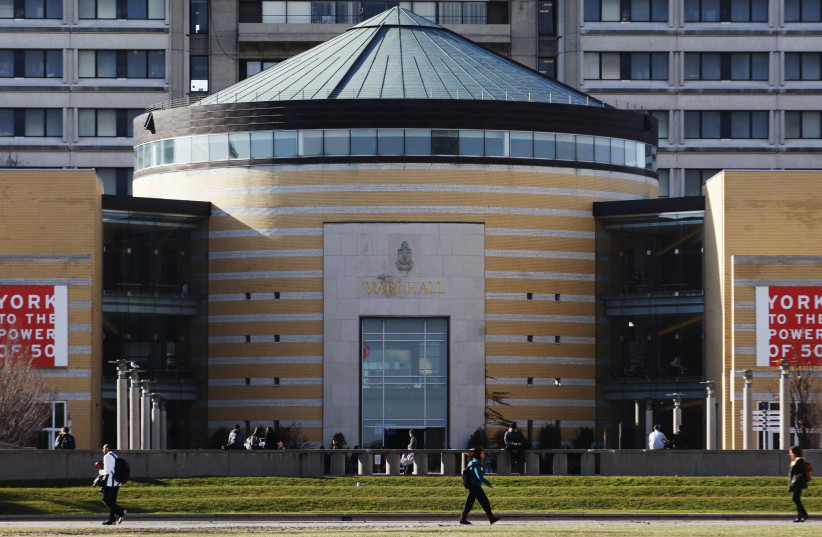In May 2021, at the height of the Israel-Hamas conflict, I was called an “apartheid apologist” and a “murderer” by my peers at York University in Toronto, simply for speaking out about the antisemitism I have witnessed and been subjected to on campus.
I had seen anti-Israel and antisemitic sentiments before but never had they threatened my own life while calling for me to be kicked out of York.
I felt lost. How could I respond to these attacks without seeing Israel for myself? I needed to understand the reality on the land to make a tangible change on campus, where Jewish students have been attacked for their Zionism.
This past summer, I went on Hasbara Fellowships Canada’s program to Israel where I met Jewish-Israelis, Arab-Israelis and Palestinians while learning firsthand the harms of the Boycott, Divestment and Sanctions (BDS) movement. Today, others still refuse to see any educational trip to Israel as balanced and educational.
A few months ago, York’s Palestine Solidarity Collective (PSC) held an event to warn its members of the “dangers of Zionist propaganda trips to Israel.” Panelists discussed how the “Zionist entity” is a settler colony that privatized land, suggesting that Zionists – the vast majority of Jews – have no connection or right to the land. Worse, they said trips such as Birthright or Hasbara are sophisticated forms of “propaganda” where the only encounters participants have with Arabs or Bedouin occur through an “Orientalist lens.”

Students at York’s law school, Osgoode, recently put out a similar statement, condemning trips to Israel with an organization known as itrek because the trips were allegedly complicit in “perpetuating the occupation of Palestine” while providing a “one-sided perspective.” This is despite itrek being a non-partisan organization that seeks to educate student leaders on the complexity of the Israeli government.
Such efforts to attack Israeli programs or trips aren’t limited to York. Last week, at OCAD University in Toronto, the OCAD student union promoted a petition to ban OCAD’s exchange program with the Bezalel Academy of Arts and Design in Israel. The petition is rife with antisemitic and discriminatory tropes. The week prior, a group called BDS Quebec campaigned for Carleton University in Ottawa to cease an Israel-based course on Israeli-Palestinian relations.
These claims – which came from those who had never been on educational trips to Israel – couldn’t be farther from the truth. Furthermore, it is obvious that those making the claims have never visited Israel themselves.
PSC, which holds the BDS movement as its central tenet, argues that only through boycotting Israeli products and organizations will liberation come for Palestinians. In reality, the BDS movement not only hurts Palestinians but also harms Jews in the Diaspora. It makes Jews unwelcome by not providing proper access to kosher food or organizations that support Israel, and thus, places a litmus test exclusively on Jewish students. To be accepted in university spaces, Jews must deny a key aspect of their identity – their Zionism.
Zionism – the belief that Jews have the right to self-determination in our ancestral homeland – has been ingrained in Jewish culture and texts for thousands of years. Being able to visit our holiest sites in person is a miracle – it was the dream of so many before us.
Being on the ground in Israel allows students to see its diversity and multiculturalism and experience people from different walks of life and political backgrounds living together. It allows you to see there is no apartheid in Israel, though there are obstacles and issues as there are in any country. For students, they are given the opportunity to meet Jews, Muslims, Christians, Druze and other identity groups, many of whom are hopeful that the future will one day bring widespread peace in the land.
Jews returning to their homeland is not colonialism, and these educational programs are not akin to propaganda. Encounters with Arabs, Bedouin and Druze are not through an Orientalist lens because Jews are not Europeans but rather an ancient people, connected through traditions and ancestry that predate the concept of Orientalism. One simply cannot walk through diverse cities in Israel such as Jerusalem or Haifa without encountering a plethora of different peoples.
It was empowering to come back on campus knowing how to combat antisemitism when I inevitably faced it, so much of which is hidden behind a blatant anti-Israel bias. Education is not propaganda – it is a stepping stone for peace. My Israel trip was a homecoming and I look forward to the day when we can come together in solidarity, rather than division.
The writer is a hasbara fellow at York University.
